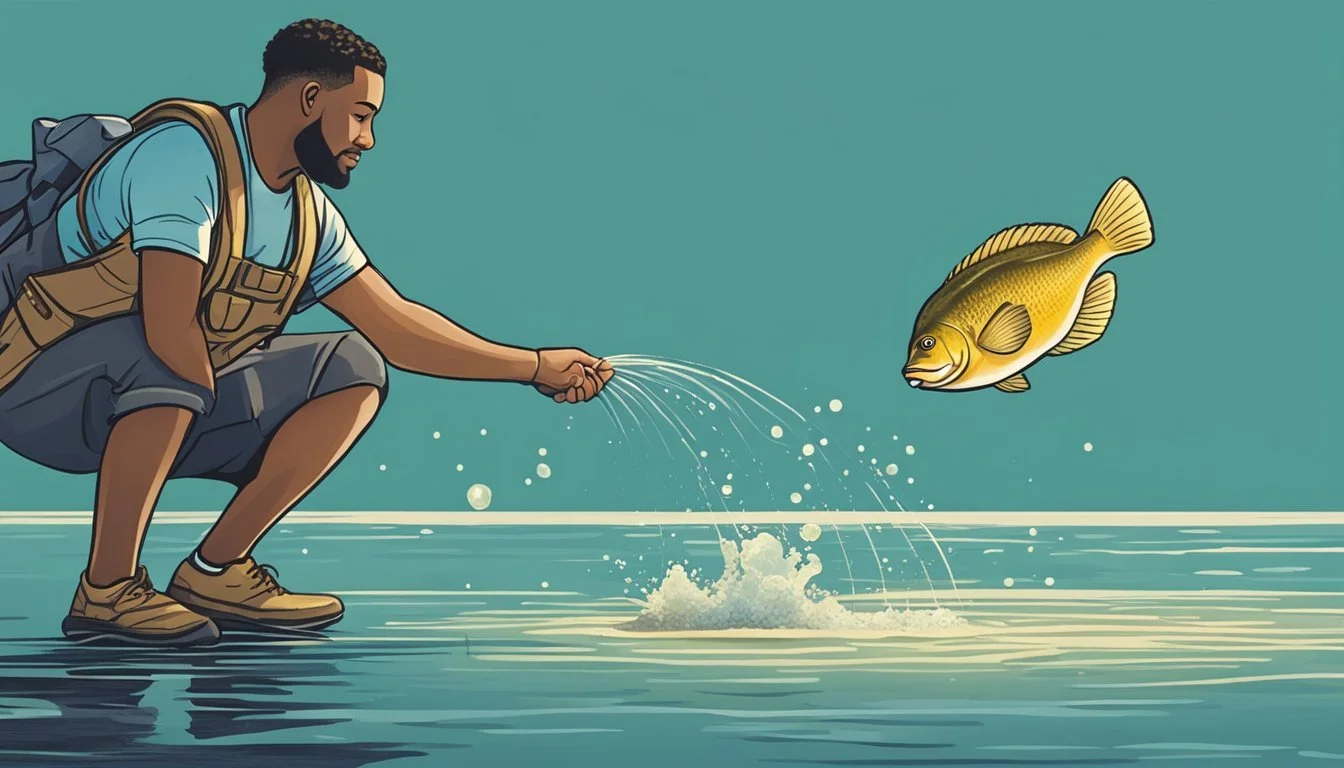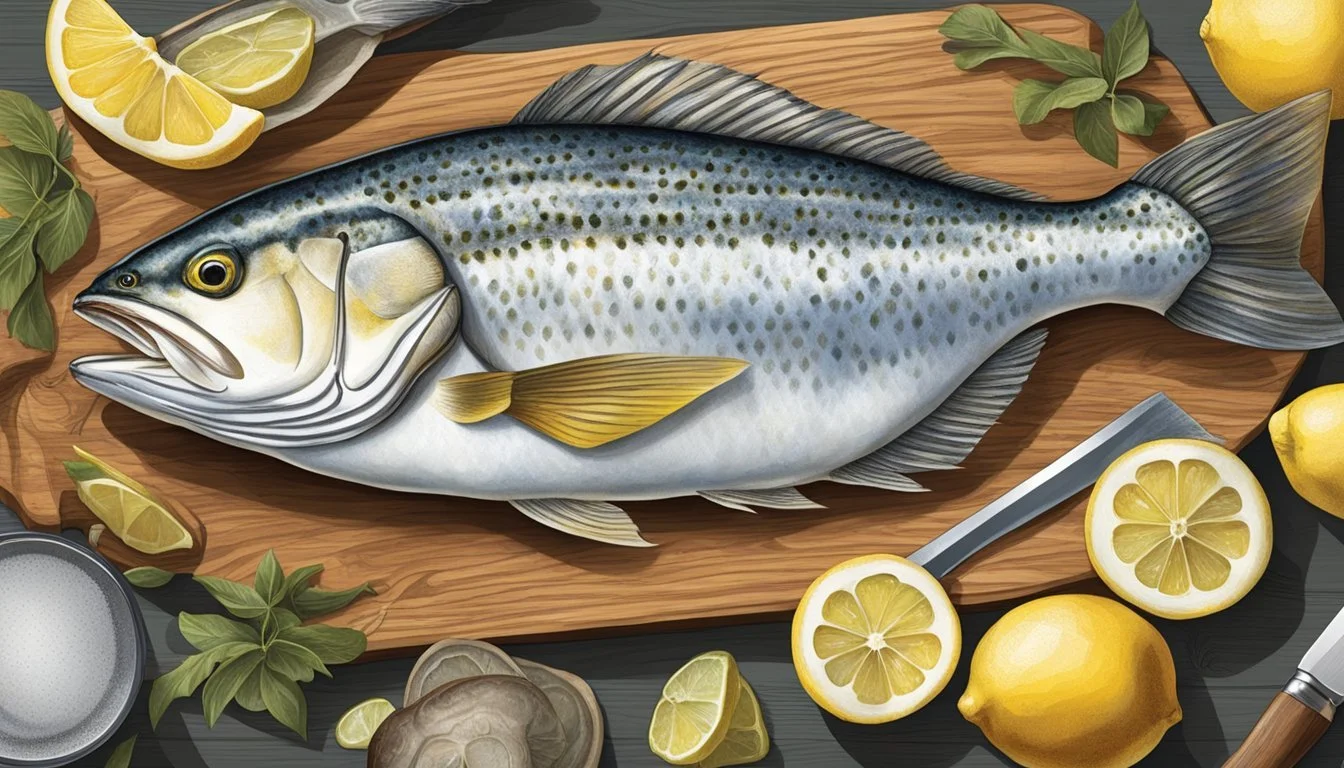Best Fish to Catch and Eat in South Carolina
A Local Angler's Guide
South Carolina's diverse aquatic environments offer anglers a bounty of fishing opportunities. From the rushing rivers and serene lakes inland to the bustling estuaries and deep offshore waters of the Atlantic, the state is renowned for both its abundance and variety of fish (What wine goes well with fish?). As a coastal state, it boasts a year-round fishing calendar, but peak seasons from May through September heighten the excitement for both novice and experienced anglarians alike.
The state's saltwater fishing scene is dominated by a variety of sought-after species. Redfish, spotted seatrout, and flounder provide thrilling inshore challenges, while deeper waters yield prized catches like mahi-mahi, wahoo, and king mackerel. For freshwater enthusiasts, South Carolina's lakes and rivers teem with largemouth bass and catfish, making it a prime location for fishing tournaments and leisure angling.
In terms of culinary delight, seafood connoisseurs often seek out local favorites such as Carolina grouper, swordfish, and black sea bass. These species are not only enjoyable to catch but offer a rich taste experience. South Carolina's adherence to sustainable fishing practices ensures that these fishing adventures can be enjoyed by generations to come, with plentiful catches that serve as both a sporting pursuit and an essential source of local cuisine.
Overview of South Carolina Fisheries
South Carolina's fisheries are diverse, offering both freshwater and saltwater angling experiences. The state's aquatic environments include vast lakes, winding rivers, and extensive saltwater coastlines dotted with piers and artificial reefs, each hosting a plethora of fish species.
In freshwater settings, the lakes and rivers of South Carolina are home to sought-after game fish. The most prominent include:
Largemouth Bass
Catfish
These species are especially prevalent in large lakes such as Lake Hartwell, which spans nearly 56,000 acres.
Saltwater fishing in South Carolina is equally rich. Anglers frequent the state's piers and coastal areas to target species such as:
Additionally, artificial reefs enhance the habitat for marine life, creating hotspots for sports fishing.
Both freshwater and saltwater fisheries in South Carolina are recognized for their contribution to local and state economies, with numerous fishing tournaments and recreational fishing activities being held annually. The state's Department of Natural Resources actively manages these waterways, ensuring sustainable and accessible fishing opportunities for all.
Popular Freshwater Fish in South Carolina
South Carolina's freshwater ecosystems abound with a variety of fish, providing anglers with exciting opportunities for both sport and table fare. The state's rivers, lakes, and reservoirs are home to numerous sought-after species, with particular hotspots including Lake Moultrie, Lake Marion, and Lake Jocassee.
Largemouth Bass
Largemouth bass are a top target in South Carolina's freshwater scene. Renowned for their fight and size, these bass are frequently found in the state's major lakes, such as Lake Marion and Lake Moultrie. They respond well to a variety of lures and baits and are a thrilling catch for anglers of all skill levels.
Striped Bass and White Bass
Lake Marion and Lake Moultrie are also prime locations for striped bass and white bass. Striped bass, especially, are known for their size and strength, making them a formidable opponent. Anglers target these bass using live bait and artificial lures, particularly in the cooler months when the fish are more active.
Catfish Varieties
Catfish in South Carolina come in several varieties, with blue catfish and channel catfish being the most popular. These bottom-dwellers are abundant in Lake Marion and Lake Moultrie. Known for their excellent taste, catfish can grow to substantial sizes and are often pursued using cut bait or stink baits.
Crappie and Bream
A staple for freshwater anglers in South Carolina are crappie and bream. These panfish are not only fun to catch but also excellent on the dinner table. They congregate in schools around structures and are particularly abundant in spring. Minnows and small jigs are effective in enticing these fish.
Trout Species in Fresh Waters
Freshwater trout fishing in South Carolina is concentrated in the cold, clear waters of Lake Jocassee and rivers in the mountain regions. While different trout species can be found, the most common catches include rainbow and brown trout. They are typically fished using fly gear or light spinning tackle and are noted for their fine taste.
Best Saltwater Fish in Palmetto State Waters
South Carolina's coast offers a diverse saltwater fishing experience, with a range of sought-after species for both recreational angling and delicious seafood. Charleston serves as a prime hub for access to these rich waters.
Redfish and Speckled Trout
Redfish, also known as spottails, are prevalent inshore and can reach weights up to 15 pounds. They have a two fish limit between 15 and 24 inches. Speckled trout or spotted seatrout, thrive in the same inshore areas, offering an exciting challenge with their cunning nature.
Redfish: Typical weight up to 15 pounds; Limit 2 per day (15-24 inches)
Speckled Trout: Known for their spots; often found near Charleston
Flounder and Sheepshead
Flounder are a favored target for their mild flavor and can be found abundantly along South Carolina's coast during summer. Sheepshead, with their distinct vertical stripes and strong teeth, are a challenging catch known for biting around piers and rocky structures.
Flounder: Best in summer; Grand Strand area hotspots
Sheepshead: Recognizable by stripes; found near structures
Cobia and Tarpon
Cobia are often found in the waters nearshore and offer a robust fight to anglers. Tarpon, prized for their impressive size and fighting prowess, can be targeted offshore during their migratory season in the warmer months.
Cobia: Strong fighters; often in nearshore waters
Tarpon: Large migratory fish; sought after for sportfishing
Kingfish and Spanish Mackerel
Kingfish, or king mackerel, roam the mid-depth waters and are notable for their high-speed strikes. Spanish mackerel, smaller yet feisty, offer fast-paced action and are plentiful along the Palmetto State’s coastline.
Kingfish: Speedy predators; mid-depth waters
Spanish Mackerel: Abundant; lively action close to shore
Deep Sea Species
Offshore fishing in the Atlantic Ocean yields a bounty of deep-sea species such as mahi-mahi, tuna, wahoo, and sailfish. Grouper and snapper are also popular targets for bottom fishing, with black seabass and amberjack rounding out the diverse catch possibilities.
Mahi-mahi: Colorful and fast-growing; offshore waters
Tuna/Wahoo: Sought after for both sport and taste; deep sea fishing
Sailfish: Distinct bill; considered a prized offshore catch
Best Times and Locations for Fishing
South Carolina offers anglers a diverse range of fishing opportunities year-round, with the best seasons and locations varying by the desired species.
Seasonal Fishing Patterns
Spring (March to May): Excellent for bass fishing on Lake Murray and Lake Wylie as fish are in their pre-spawn and spawn phases. The Santee River is also productive for catfish during this period.
Summer (June to August): Summertime is prime for saltwater species. Inshore fishing at Murrells Inlet and Mount Pleasant yields redfish and spotted sea trout. Offshore, anglers target mahi-mahi, marlin, and sailfish.
Fall (September to November): Surface water temperatures begin to drop, making it a great time for largemouth bass at Lake Wateree and Lake Hartwell. In October, Myrtle Beach becomes a hotspot for red drum fishing as they are in abundance.
Winter (December to February): While considered slower, anglers can still find striped bass action in freshwater locations like Lake Murray.
Key Fishing Spots by Location
Myrtle Beach:
Surf fishing: Red drum, spotted sea trout
Offshore: Wahoo, King Mackerel
Murrells Inlet:
Inshore: Flounder, Red drum
Mount Pleasant:
Inshore waters: Target species include redfish and flounder.
Lake Wateree:
Freshwater: Known for largemouth bass, crappie.
Lake Hartwell:
Freshwater: Home to striped bass and largemouth bass.
Lake Wylie:
Freshwater: Largemouth bass and catfish are popular targets.
Lake Murray:
Renowned for bass fishing tournaments; also hosts crappie, bream.
Santee River:
Offers diverse freshwater fishing, particularly for catfish.
Fishing Techniques and Bait Choices
In South Carolina, the choice of fishing technique and bait is paramount for a successful catch, with methods varying significantly across freshwater and saltwater environments. Anglers should carefully select their approach based on the fish species they target.
Freshwater Fishing Methods
Kayak Fishing: Inland anglers often use kayaks to quietly access shallow water and cover different freshwater habitats. Jigs and lures are effective when casting from a kayak.
Bass Fishing Techniques: For bass, a combination of finesse and power fishing methods works well. Use plastic worms for subtle presentation in clear water, whereas spinnerbaits and crankbaits perform best in stained waters.
Saltwater Fishing Tactics
Inshore Fishing: Fishers can employ light tackle spinning or fly fishing in the estuaries and creeks. Shallow water fishing for species like redfish is particularly popular.
Offshore Fishing: For deeper waters, anglers choose heavier tackle. Trolling with large lures or live bait such as mackerel or squid is common when targeting species like mahi mahi or king mackerel.
Bait and Lure Selection
Live Bait: For inshore fishing, live shrimp and mullet are excellent choices, often leading to successful catches of spotted seatrout and flounder.
Lures: A versatile selection of lures such as jigs, soft plastics, and topwater plugs caters to various saltwater species. Surf fishing enthusiasts often use spoons and jigs tipped with bait for extra attraction.
Conservation and Regulations
South Carolina boasts a vast array of fish species, both freshwater and saltwater. Conservation efforts and adherence to state regulations are crucial to maintaining the Palmetto State's aquatic resources for future generations of anglers.
Responsible Fishing Practices
Responsible fishing practices include understanding and maintaining the balance of the ecosystem, such as not disrupting local vegetation and habitats. Anglers should practice catch and release for certain species, especially during spawning seasons, to allow populations to replenish. Additionally, they need to be aware of and follow all advisories, such as those for contaminants like PFAS.
Handle Fish Carefully: When practicing catch and release, handle fish gently and minimize the time they're out of the water.
Avoid Sensitive Areas: Do not fish in areas where game fish are known to spawn or where vegetation is delicate.
South Carolina Fishing Licenses and Limits
All anglers in South Carolina are required to have a valid fishing license unless exempt by age or other specific state provisions. Both freshwater and saltwater fishing have specific regulations regarding size and catch limits by fish group to ensure sustainability of the fishing activities.
Licenses: Must be acquired by residents and non-residents.
Limits:
Freshwater: Limit varies by species.
Saltwater: General regulations apply, with allowances differing among species.
Regulations Table:
Fish Species Size Limit (Inches) Catch Limit (Per Day) Redfish 15-23 3 Spotted Seatrout Min. 14 10 King Mackerel Min. 24 3
Note: The above table is an example and does not cover all regulations. Anglers should consult the latest rules from the South Carolina Department of Natural Resources before fishing.
Fishing Equipment and Gear
When angling in South Carolina waters, fishing gear plays a pivotal role in both the success and enjoyment of the fishing experience. An angler's toolkit should include a variety of jigs and lures, suitable for the diverse species found in the state. Jigs, due to their versatile nature, can effectively attract the attention of fish like bass, especially when combined with the appropriate technique and water temperature conditions.
Live bait also offers a reliable way to entice fish, imitating the natural prey of species such as redfish and flounder. Anglers should consider the local prey of the target species when selecting their bait for optimal results.
A well-equipped kayak can significantly enhance the inshore fishing experience, allowing access to shallow creeks and estuaries abundant with game fish. For kayak fishing, lightweight and compact gear are preferred for maneuverability and ease of use.
Anglers should consider the following gear essentials for a successful outing:
Rods and Reels: Medium to heavy action rods for saltwater, lightweight for freshwater.
Fishing Line: Braided lines for strength and sensitivity.
Hooks: A variety of sizes to match the bait and target species.
Jigs and Lures: Bright and reflective colors for clear waters; darker hues for murky conditions.
The temperature of the water can affect fish behavior, thus it’s important for anglers to have a thermometer for checking water temperature, as this can dictate the type of lures or bait to use. Warmer waters may require different lures compared to cooler temperatures where fish might be less active.
Whether fishing from the shore, boat, or kayak, each piece of gear should be selected with careful consideration of the fishing conditions and targeted fish species to ensure a rewarding fishing adventure in South Carolina.
Fishing Safety and Etiquette
When fishing in South Carolina, anglers should prioritize safety by staying informed about weather conditions and water currents. They must check the weather forecast before setting out, as sudden storms can create hazardous conditions. Awareness of high tide patterns is crucial because they can strongly impact currents and the success of the fishing trip.
Safety gear, including life vests and first aid kits, should be readily available. It is essential for fishers to educate themselves on identifying and responding to rip currents, which can pose significant risks.
Fishing etiquette involves respecting fellow anglers and the environment. Fishers should:
Maintain a proper distance from other anglers to avoid crossing lines.
Handle fish with care if practicing catch and release.
Follow local regulations regarding size and catch limits to support fisheries management.
Fish Consumption Advisories offered by local agencies provide guidelines on fish that are safe to eat. Anglers should consult these to ensure that their catch does not contain harmful levels of chemicals.
Lastly, clean up any trash or leftover gear, preserving South Carolina's waterways for future enjoyment. By following these practicable safety measures and etiquette, anglers contribute to a safer and more respectful fishing community.
Local Fishing Communities and Events
Charleston and Myrtle Beach are hubs for South Carolina's vibrant fishing communities, offering a vast array of events that cater to anglers of all levels. Charleston, known for its rich history and culture, also boasts numerous fishing tournaments, including the famous annual Charleston Fishing Classic.
In contrast, Myrtle Beach serves as a family-friendly fishing destination that hosts events like the Myrtle Beach Fishing Rodeo, drawing visitors with its expansive coastline and tourist amenities.
Murrells Inlet, often referred to as the "Seafood Capital of South Carolina," isn't just famous for its seafood restaurants but also for its strong fishing community and the annual Murrells Inlet Fishing Tournament.
Community Event Notable Species Charleston Charleston Fishing Classic Redfish, Tarpon Myrtle Beach Myrtle Beach Fishing Rodeo King Mackerel, Mahi Mahi Murrells Inlet Murrells Inlet Fishing Tournament Spotted Seatrout, Flounder
These communities not only offer high-caliber fishing opportunities but also foster camaraderie and conservation through local events. The tournaments are excellent occasions for anglers to demonstrate their skills, share local fishing tips, and celebrate the catch of the day. Each community has its unique charm and contributes to the tapestry of South Carolina's fishing culture, making it a destination of choice for fishing enthusiasts.
Conclusion and Recommendations
When planning a fishing trip to South Carolina, anglers can look forward to the rich array of fish that populate its waters. Whether in freshwater or saltwater, the state offers a memorable experience.
Saltwater Recommendations:
King Mackerel — Accessible and exciting, ideal for marine fishing close to shore.
Spotted Seatrout — Provides a fun challenge and is excellent for inshore fishing.
Flounder— Best targeted in the Grand Strand area inlets for both sport and taste.
Freshwater Recommendations:
Largemouth Bass— A top choice in lakes, revered for both sport and taste.
Catfish— Abundant in rivers, offering both a plentiful catch and a hearty meal.
For the best experience, it's recommended to adhere to local fishing regulations and seasons. Hiring a local guide may enhance the trip, providing expert knowledge on the best spots and techniques.
The following table highlights the optimal fishing choices:
Fish Type Location Suggestion Experience King Mackerel Nearshore Exciting Spotted Seatrout Inshore waters Challenging Flounder Grand Strand area inlets Rewarding Largemouth Bass Lake Murray Satisfying Catfish State's rivers Plentiful
Anglers of any skill level will find South Carolina's waters welcoming and bountiful, making any fishing expedition one to remember for its remarkable catches and enjoyable atmosphere.





